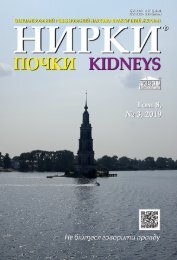Журнал "Почки" том 8, №4
Create successful ePaper yourself
Turn your PDF publications into a flip-book with our unique Google optimized e-Paper software.
Ïîãëÿä íà ïðîáëåìó / Looking at the Ðroblem
32. Henriques A.C., Carvalho F.H.C., Feitosa H.N. et al. Endothelial
Dysfunction after pregnancy — induced hypertension. Int.
J. Gynecol. Obstet. 2014. Vol. 124(3). P. 230-234. doi: 10.1016/j.
ijgo.2013.08.016, indexed in Pubmed: 24326066.
33. Altoama K., Mallem M.Y., Thorin C. et al. Effect nebivоlol
treatment during pregnancy in the intrauterine fetal growth, mortality
and pup postnatal development in the I-NAME-induced hypertensive
rats. Eur. J. Pharmacol. 2016. Vol. 791. P. 465-472.
34. Lupanov V.P. Highly selective long-acting 1-blocker with
vasodilating properties of Nebivolol in the treatment of patients with
chronic coronary heart disease. Rational pharmacotherapy in cardiology.
2012. № 8(4). Р. 554-560.
35. Lip G.Y. Effect of atenolol on birthweight. Am. J. Cardiol.
1997. Vol. 79. P. 1436-1438.
36. Bayliss Н. et al. Antihypertensive drugs in pregnancy and fetal
growth: evidence for “pharmacological programming” on the first trimester?
Hypertens Pregnancy. 2002. Vol. 21. P. 161-174.
37. Ray J.G. et al. Use of antihypertensive medications in pregnancy
and the risk of adverse perinatal outcomes: McMaster outcome
study of hypertension of pregnancy 2 (MOS HIP 2). BMC Рregnancy
Childbirth. 2001. № 1. P. 6.
38. Brown М.А. et al. Australasian Society for the Study of hypertension
of pregnancy: The detection, investigation and management of
hypertension of pregnancy: full consensus statement. Am. J. Gynecol.
2000. Vol. 40. P. 139-155.
39. Magee L.A., Abdullah S. The safety of antihypertensives for
treatment of pregnancy hypertension. Expert Opin. Drug Saf. 2004.
Vol. 3. P. 25-38.
40. Duan L., Ng A., Chen W. et al. Beta-blocker and risk of low
birth weight in newborns. J. Chin. Hypertens (Greenwich). 2018.
Vol. 20. № 11. P. 1603-1609.
Отримано/Received 24.10.2019
Рецензовано/Revised 03.11.2019
Прийнято до друку/Accepted 12.11.2019
Information about author
Olena Taran, PhD, Associate Professor at the Department of n ephrology and renal replacement therapy, Shupyk National Medical Academy of Postgraduate Education, Kyiv, Ukraine
Òàðàí Å.È.
Íàöèîíàëüíàÿ ìåäèöèíñêàÿ àêàäåìèÿ ïîñëåäèïëîìíîãî îáðàçîâàíèÿ èìåíè Ï.Ë. Øóïèêà, ã. Êèåâ, Óêðàèíà
Ëå÷åíèå àðòåðèàëüíîé ãèïåðòåíçèè ó áåðåìåííûõ
Резюме. Синдром артериальной гипертензии (АГ) может
иметь место при развитии беременности как предшествующая
патология, а также быть клиническим симптомом нефропатии
беременных. АГ любого происхождения является фактором
риска развития нефропатии (преэклампсия/эклампсия),
вызывает осложнения самой беременности (отслойка плаценты,
преждевременные роды, мозговые сосудистые нарушения,
развитие диссеминированного внутрисосудистого
свертывания, полиорганная недостаточность), значительно
повышает риск заболеваемости и смертности матери, плода
и новорожденного. К негативным последствия АГ во время
беременности относят более тяжелое ее течение после окончания
беременности, более осложненное течение следующей
беременности. АГ повышает риск внутриутробной задержки
развития и внутриутробной гибели плода. Не решена проблема
тактики и выбора антигипертензивной терапии с учетом
негативного влияния некоторых групп антигипертензивных
препаратов на общую гемодинамику беременной, плацентарное
кровообращение, задержку развития плода, возникновение
пороков его развития. Доказательная база препаратов,
направленных на лечение осложнений у беременных с АГ с их
влиянием на развитие плода, недостаточна. В данной статье
выполнен краткий обзор современных подходов к лечению
АГ беременных невазодилататорными и вазодилататорными
селективными бета-блокаторами. С позиции нефролога, по
данным результатов проведенных исследований, назначение
селективных бета-блокаторов во ІІ–ІІІ триместре беременности
не представляет угрозы для организма матери и плода, а в
І триместре наиболее безопасным и эффективным большинству
исследователей представляется вазодилататорный селективный
бета-блокатор небиволол. Однако что касается срока
назначения препарата, то исследовательских работ на доказательном
уровне все же недостаточно для окончательной рекомендации
назначать небиволол в I триместре беременности.
Ключевые слова: бета-блокаторы; небиволол; артериальная
гипертензия; беременность
O.I. Taran
Shupyk National Medical Academy of Postgraduate Education, Kyiv, Ukraine
Treatment of arterial hypertension in pregnant women
Abstract. Arterial hypertension (AH) syndrome can occur with
the development of pregnancy as a previous pathology, or be a clinical
symptom of nephropathy in pregnant women. AH of any origin
is a risk factor for the development of nephropathy (preeclampsia/
eclampsia). It causes complications of pregnancy itself (placental
abruption, premature birth, cerebrovascular disorders, the development
of disseminated intravascular coagulation, multiple organ
failure), significantly increases the risk of both morbidity and mortality
for a mother, fetus and newborn. Hypertension may result in a
more difficult course of pregnancy and may complicate subsequent
pregnancies. AH increases the risk of intrauterine growth retardation
and fetal death. When selecting a tactical solution or choosing
an antihypertensive therapy, it is necessary to take into account the
negative impact of certain groups of antihypertensive drugs on the
general hemodynamics in a pregnant woman, on the placental circulation,
fetal growth restriction, and developmental defects. This
is why no definitive recommendation can yet be made. The database
of drugs aimed at treating AH-related pregnancy complications
contains insufficient evidence with regard to the drug impact
on fetal development. This article provides a brief overview of modern
approaches to the treatment of hypertension in pregnant women
with non-vasodilatory and vasodilatory selective beta-blockers.
From the perspective of a nephrologist, according to the results of
the studies, the prescription of selective beta-blockers in the II–III
trimester of pregnancy does not pose a threat to either mother or
fetus. In the first trimester, most researchers consider nebivolol, a
vasodilatory selective beta-blocker, to be the safest and most effective
choice. Nonetheless, the studies carried out so far do not provide
sufficient evidence to recommend nebivolol for prescription in
the first trimester of pregnancy.
Keywords: beta-blockers; nebivolol; arterial hypertension; pregnancy
Òîì 8, ¹ 4, 2019
www.mif-ua.com, http://kidneys.zaslavsky.com.ua 59














